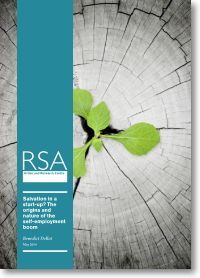The RSA Action and Research Centre have just published Salvation in a start-up? The origins and nature of the self-employment boom (Benedict Dellot, May 2014).
A collaboration between The RSA and Etsy, an on-line creative and craft market place, founded in New York in 2005, the report is part of a forthcoming series which…
examines what types of micro-businesses are becoming more commonplace? What has caused the large increase in recent years? And what effect are they having on the economy and wider society?

The report argues that the current economic landscape contains six tribes of self employment. The Visionaries, the Classicals, the Independents, the Locals, the Survivors and the Dabblers.
We at conversationsEAST would have liked to see a seventh category, or is it an overlay to do with motive for the existing players? That of the ‘socially motivated’ self employed. Whether a visionary at the top of the list or a part-time, older dabbler at the bottom, all may have begun their entrepreneurial journey with a passion to undertake an ethical, socially focused business or activity.
(There must be Fellows in the East of England who fit into this latter, socially motivated cohort, given the ‘societal change’ remit of our Society? – Ed.)
![]() Download a full copy of this report in pdf format here...
Download a full copy of this report in pdf format here...
The largest of the cohort surveyed were the Survivors. Earning less, and more likely to be younger. Whilst the argument for overwhelming market competition that forces this group to struggle to survive may be a good one, if viewed through a more ethical, social business lens, the lack of focus on personal income but rather on softer, less tangible social outcomes for an entrepreneur like this would also affect the findings too.
Another interesting focus in the report is the Happiness Paradox. The traditional view of self employment, it can be argued, is of an isolated, stressed individual who struggles to make ends meet. This rather cliched description is belied by other findings that suggest those who seek self employment are ‘…more content at work and happier in their lives’.
Stress there is, without doubt, but the RSA report highlights other academic research that sees the development of self employed enterprise as ‘…long periods of relative stability punctuated by critical episodes of transition and change’. The gains for the individual in life outcome are only punctuated by pains periodically. The management of change, or how to pivot the enterprise, is a key skill for the entrepreneurial micro-business, social or otherwise.
Do these finding matter? Yes they do. The RSA research findings offer a subtle and detailed analysis of self employment, its conditioning, content and motive. It disposes of the traditionally held viewpoint that older people, who are pushed or pulled into self employment, represent the core. When in fact, by age, motive and shades of effectiveness the position is more complex.
Does this affect our region? Yes it does. This focus on self employment, who by and how it is operated should condition the thinking of Fellows who are looking at projects involving education, social entrepreneurship, skills and sectoral growth in any field. Self employment is a conditional state. Entrepreneurship is about opportunity recognition and the philosophy of risk. The two are connected.
The ‘social business’, delivered by one or a group of entrepreneurs, wholly focused on social outcome is, we would argue at conversationsEAST, a sound model for sustainability of a project. What a great solution to economic change and development in communities – social entrepreneurs delivering innovative ethical business models over time.
Arguably, if the new report Salvation in a Start-up has rewritten the self employment landscape, combining it with social enterprise can re-write a community landscape? What do you think?
![]() See the report highlights in the Enterprise section of The RSA Action & Research Centre web pages here…
See the report highlights in the Enterprise section of The RSA Action & Research Centre web pages here…
